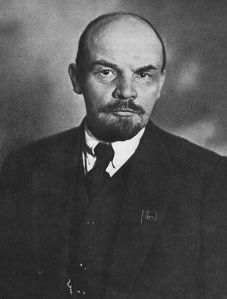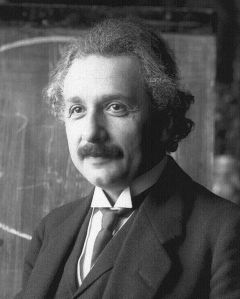The Ten Most Influential People of the 20th Century
10. J. Robert Oppenheimer (1904-1967)
Physics

One of the trademarks of the 20th century, horrible though it may be, is the creation of the atomic bomb. This is the ultimate weapon of destruction which set our world into a state of fear for the latter half of the century with the cold war, as well as put an abrupt end to the Second World War. Oppenheimer was a brilliant physicist, unfortunately his legacy will always be the bomb. Oppenheimer is sort of like the real life Frankenstein; horrified at what he had created, but unable to unmake it.
9. Sigmund Freud (1856-1939)
Psychology

When Freud came along, he changed the way we thought about the way we think. He essentially created the field of psychoanalysis, working on interpreting our dreams and our subconscious. He also made a huge advancement in the liberation of sexual dialogue in society today.
8. Bill Gates (1955- )
Computers

When Gutenburg created the printing press, be revolutionized the world by allowing ideas to spread through the written page. Bill Gates could perhaps be called the Gutenburg of the information age. Though he didn’t invent the computer, be did make it accessable to almost everyone in the developed world, once again revolutionizing how we spread information around the globe.
7. Martin Luther King Jr. (1929-1968)
Civil Rights

He had a dream, and people responded. He was one of the most passionate speakers we had seen since the war, and he fought for a noble and just cause. He tried to repair race relations by bringing people together rather than keeping them apart. He brought down the Jim Crow laws in the states. Though his work is not yet finished, but set the people of his country on a mission of equity and justice.
6. Vladimir Lenin (1870-1924)
Politics

Communism was simply a theory on the pages of Marx and Engels’ Communist Manifesto until Lenin came along with a vision to use Russia to put it into practice. His Russian Revolution in 1917 shook the world. Communism spread quickly through Eastern Europe and Asia, though the heart of it was in Russia. Lenin made a superpower out of the USSR and made an indelible mark upon the world.
5. James Watson and Francis Crick (1928- , 1916 – 2004)
Biochemistry

The number five position actually goes to two people, the scientific pair of Watson and Crick. These two biologists discovered and developed the molecular structure of DNA, the genetic material which are the blueprints to our bodies and lives. Today, the impact of their model is everywhere, from cloning, to the Human Genome Project, to genetic engineering. Biotechnology is the wave of the future, and it all began with Watson and Cricks’ double helix.
4. Mahatma Ghandi (1869-1948)
Politics

Ghandi was the leader of India during their revolt against the British Empire which made them an independent nation. Yet Ghandi’s influence far beyond this. Even today, Ghandi is a symbol of the power of peace. His non-violent movements were an inspiration to the world. It is this radical thinking that peace can make a difference that sets him apart form most other leaders of the age.
3. Henry Ford (1863-1947)
Industry

Henry Ford changed the way the world travelled with his Model T, popularizing the motor vehicle. But not only that, Ford’s major influence comes from his use of the assembly line and promotion of mass production. This is largely responsible for the industrial revolution’s massive spike at the beginning of this century and a big reason why technology and industry are at the point where they are at today.
2. Adolf Hitler (1889-1945)
Politics

Unfortunately, the most influential people in our history are not always influential in a positive way. Sometimes there are those whose influence upon the world is one of horror and evil. Adolf Hitler has become synonymous with the word evil. His great ambitions ensnared Germany and began the Second World War, one of the largest events in world history. His terrible policies of discrimination and hate led to the holocaust, one of the greatest atrocities of our time. Hitler didn’t just leave a mark on the world, he left a scar.
1. Albert Einstein (1879-1955)
Physics

Over the last couple of centuries, scientific advancement has been making some major advancements, but when Einstein came along, he really took things to a new level. Einstein’s theories revolutionized the way physicists think about nothing less than the universe itself. Time and space were suddenly connected and no longer constant. The theory of relativity would change Einstein’s field. Einstein’s influence on modern science is one that is so strong, it will cover all scientific areas for many years to come.
[…] The Ten Most Influential People of the 20th Century […]
IanTheCool’s 300th Post Spectacular!!! « Ianthecool's Movie Reviews - January 22, 2012 at 11:57 am |
why not mr jinnah
Anonymous - April 28, 2012 at 10:23 am |
Give me a good argument.
ianthecool - April 28, 2012 at 10:27 am |
If it were nor for Mohandas K. (Mahatma) Gandhi, Jinnah would not have had a hunderdth the voice potential that he did
tyf79f 76fr97 - February 11, 2013 at 6:29 pm |
Winston Churchill?
Anonymous - July 24, 2012 at 12:19 am |
He’s influential to be sure. Not sure if moreso than these 10 however.
ianthecool - July 24, 2012 at 11:27 am |
And no FDR either, whose revolutionary New Deal changed American politics for ever and also was an outstanding leader during WW2. He also was responsible for the establishment of the United Nations and authorizing the development of the Atomic bomb.
Anonymous - February 10, 2024 at 1:57 am |
Great list – hard to argue with any of them. I’m not sure if a case can be made for Alan Turing instead of Gates.
Randy - August 20, 2012 at 10:12 pm |
Wow I thought it was gonna be singers!!!!!!!
Aaliya booxiiiiiii - September 1, 2012 at 10:20 am |
why people don’t seem to like it if someone talks about Mr.Jinnah as a great leader. i understand.
but… think about the hardwork day and night to give those people their own country at least to live in peacefully and freely, without anyone other nation’s help. in the holocaust topic, we blame God for the death of 1 million jewish kids and now we calling Mr.Jinnah wrong who gave freedom, peace to the people, poor children and future generation a identity, security and something to be proud of as muslims or pakis.
no matter what but as a LEADER he seems 100% nice man to me.
STUDENT - December 11, 2012 at 3:38 pm |
Jinnah created a nation that has a religious identity. India was going to be a secular nation in which all religions were equal. A Muslim living in India today probably has many more opportunities and is definitely safer than one in Pakistan. What Mr. Jinnah did was not to liberate the Pakistani people but to make their futures less certain than they would have been. The Muslim minority in India is treated equally to Hindu majority and other religions under the law, whereas minorities in Pakistan are far too often subjected to a life of persecution and hardship, and the Pakistani people in general have anything but security
tyf79f 76fr97 - February 11, 2013 at 6:36 pm |
Not to defend Jinnah here, (I’m not,) but India was hardly secular when Pakistan was made, the civil war was far from just Jinnah’s extremist muslims being intolerant of everyone else;
India and Pakistan were made in conflict… the enormous support that created the Pakistani army was made from religious intolerance from the Hindi majority of the time.
War isn’t simple; no side in any war fights for unjust causes; it’s what’s made in the fighting and afterwords that changes. The PEOPLE, not the leaders, are the reason for conflict, the leaders though are the ones who end up deciding the results.
So when we talk about the Germans in WW2 wanting freedom from political chaos and unjust economic constraints; or the Southerners of the US civil war wanting freedom from economic oppression; we aren’t talking about the assholes that push for the Jews being killed off or the people who want slavery out of greed;
Those aren’t motivaters that unite a people in arms, noone risks their home and family because they hate someone else… it’s the will the protect that home and family in the face of what appears to be a threat.
Pakistan is no different; the Muslims were threatened by the Hindi majority, and often on both sides there were conflicts, killings, and enormous cultural strife.
So it’s understandable that the Pakistani people would fight for a nation free from that… which although not the case now, was horrible in the 40’s.
So when you talk about what Jinnah did, keep in mind the state of India of the time, and what people strived for, compared to what they achieved.
All I’m really saying is your comparison to India is fairly irrelevant, and is brought up a lot when people talk about Jinnah to draw parralels that really aren’t appropriate.
Jinnah tried to make a place where Islam could be practiced free from judgement and being oppressedby other religious majorities.
Regardless everything else he did, he definitely did what he set out to do. He definitely created freedom to practice Islam, something most Indian Muslims didn’t have.
But yah, he was kind of an obbsessive, intolerant psycho.
Al Jolson - March 16, 2013 at 1:27 am
Even India today is gripped with the evils of poverty, terrorism, corruption and communalism. Would you say that Mahatma Gandhi liberated the nation for a wrong cause?
Anonymous - January 5, 2014 at 1:48 pm
oh, racism and prejudice everywhere but to make things simple i just want to focus on Mr. Jinnah as leader only please.
STUDENT - December 11, 2012 at 3:42 pm |
Where is Michael Collins? He brought the British Empire crumbling down at the feet of the Irish natoon
me - April 13, 2013 at 5:34 pm |
India is better of without Pakistan being part of it. Muslim would have been third of Indian population and would have been difficult to manage.
Anonymous - April 15, 2013 at 11:46 am |
Howard Florey, isolated penicillin, saved an estimated 10 million lives to date. Surely that is one of the most significant events of the 20th century.
Anonymous - May 9, 2013 at 1:05 am |
People who do not list Winston Churchill in at least the top 5 are without serious knowledge of history. And to place Hitler on the list without putting Churchill there as the man responsible for his defeat is ridiculous! Read! Know something about the man who brought Stalin and Roosevelt into the fight against Hitler and massaged both their egos in order to maintain the alliance. In my opinion as a serious student of history Churchill should be second but if not that then at least top five. He could be more important than Einstein in a practical sense that means how it effects every day life.
Jeff Hinton - July 3, 2013 at 3:49 pm |
I forgot to bring up the fact that for better or worse Churchill also was the primary factor creating the modern state of Iran and championing the birth of the state of Israel.
Jeff Hinton - July 3, 2013 at 3:53 pm |
che guevara?
Anonymous - October 27, 2013 at 9:47 am |
Hell of a lot better than Time’s Top 100, which didn’t include Adolf Hitler (I guess advertisers’ dollars are more important than writing with honesty and integrity), but did include Bart Simpson.
John - November 14, 2013 at 10:40 am |
Seriously? Bart Simpson?
ianthecool - November 14, 2013 at 9:24 pm |
Don’t forget the entertainment fields. Elvis, ‘the beatles(cheating)’, Walt Disney, huge cultural impacts imho.
jody - August 7, 2014 at 9:51 am |
I think Gandhi should be amongst the top three. He was perhaps the first human being who proved that the noble ideals of love, compassion, truth and non-violence were not only confined to the spiritual realm, but could also be applied in politics on a large scale. He preached that one should be compassionate even towards one’s opponent. Also that ahimsa (non-violence) was far more powerful than violence and hate. His radical message to the world will remain relevant for millenia. His influence is no doubt more than Henry Ford.
P.S: I have great respect for Henry Ford and do not deny his influence.
Tapan - April 11, 2015 at 1:14 pm |
Good point.
ianthecool - April 12, 2015 at 2:45 pm |
WINSTON CHURCHILL?!!!!!
Shannon - December 17, 2017 at 3:04 pm |
Tim Berners-Lee?
Idiotgenius - February 7, 2019 at 3:54 am |